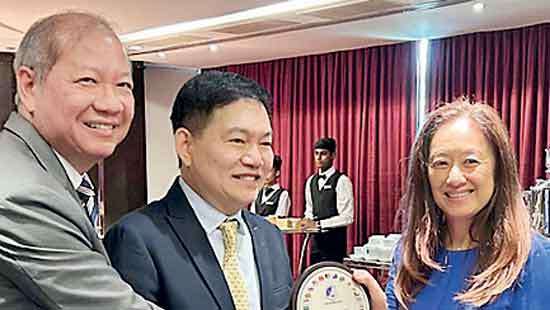By: Staff Writer
May 11, Colombo (LNW): The United States has officially assumed the Presidency of the Colombo Plan Council, with US Ambassador to Sri Lanka Julie Chung taking over the role during a Special Session held on May 7, 2025. This annual rotating presidency, determined in alphabetical order among the 28 member states, was previously held by Thailand.
The Special Session in Colombo brought together high-level diplomats and officials, including outgoing Council President and Thai Ambassador Paitoon Mahapannaporn, Sri Lanka’s Deputy Foreign Minister Arun Hemachandra, and Indonesia’s Deputy Minister for Multilateral Cooperation, Tri Tharyat. The session was attended by 23 member states, with eight ambassadors and 15 deputy ambassadors participating, both in person and virtually.
The Colombo Plan Council consists of representatives from member states’ diplomatic missions based in Sri Lanka. Since 2020, virtual participation has enabled broader engagement from members located outside Colombo. The Council convenes quarterly to discuss the organization’s strategic direction and ongoing initiatives.
The United States holds a unique position within the Colombo Plan as the first non-Commonwealth country to join the organization in 1951. It has since been a strong supporter of Sri Lanka’s development efforts, particularly in the ports sector, by contributing technical assistance and counter-narcotics programming aimed at improving security and operational efficiency.
As the Colombo Plan prepares to celebrate its 75th anniversary in 2026, Ambassador Chung’s leadership is expected to guide both the commemorative activities and the organization’s evolving strategic vision. The milestone marks a significant chapter in the history of one of Asia-Pacific’s oldest regional intergovernmental bodies.
Founded on July 1, 1951, the Colombo Plan was established to promote cooperative economic and social development across Asia and the Pacific. Its origins trace back to the Commonwealth Foreign Ministers’ Conference held in Colombo in January 1950.
There, Sri Lankan Finance Minister J.R. Jayewardene and Australian Foreign Minister Sir Percy Spencer jointly championed the idea of a ten-year development program for Southeast Asia, laying the groundwork for the Plan.
Initially supported by seven nations—Australia, Canada, India, Pakistan, New Zealand, Sri Lanka, and the UK—the Colombo Plan has since expanded to include 28 member countries, including non-Commonwealth and regional partners such as ASEAN and SAARC members.
The Colombo Plan continues to function as a partnership for mutual and self-help among member countries, promoting socio-economic development, technical cooperation, and the exchange of knowledge. Its highest governing body, the Consultative Committee, meets biennially to review progress and address current development challenges across the region.
With new leadership at the helm and a historic anniversary on the horizon, the Colombo Plan looks set to reaffirm its commitment to regional cooperation and development.

